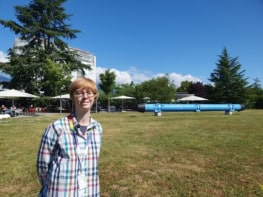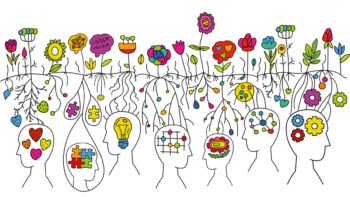Getting experience beyond your core academic activities is crucial if you want to bag that dream job after graduating, as Institute of Physics careers manager Vishanti Fox explains

Gaining a degree in physics is no mean feat. As a student, you’re busy completing lots of assignments in many different modules, and tackling experiments in the lab too. So it isn’t surprising that, for most students, extracurricular activities often fall into a black hole of “things you don’t have time for”. However, having a rich life outside your core academic activities is vital when it comes to helping you figure out what you want to do after you graduate, and getting the right job.
While good grades are important, students also need a broad range of transferable skills. This includes learning prioritization, communication, teamwork and problem solving; taking initiative, showing resilience and leadership; and developing business acumen and skills such as negotiation and persuasion. The need for transferable skills isn’t limited to jobs in industry – you’ll need these skills even if you want to build an academic career.
Indeed, in my experience of working with companies that hire physicists, the most employable graduates are those who engage in extracurricular activities. By doing so, students are exposed to new and challenging environments, which builds their confidence, and often leads to further opportunities.
Such extracurricular activities includes not only part-time jobs, summer placements and internships, but also everything from coaching, tutoring and managing your physics society to sitting on a committee, contributing to a special interest group, organizing events or volunteering. By participating in these activities, you are, consciously or unconsciously, preparing yourself for the next stage in your life, wherever this takes you.
Taking up a placement or internship, especially in a field or company that you may want to work for, is a particularly good idea. There are many ways to go about this. While you can find a placement or internship under your own steam, there are many resources in place to help. For a start, speak to your careers adviser or tutor, who can point you in the right direction. The Institute of Physics (IOP) also offers a number of opportunities to help you gain experience and develop those all-important transferable skills (see box below). A handful of graduate training programmes have even been officially accredited by the IOP, all of which combine dedicated events, training modules, professional development, mentoring and on-the-job experience.
The IOP currently works with 21 companies, from Atkins and Leonardo to EDF and Sellafield, which deliver graduate training programmes for physics students, through the Accreditation of Company Training Schemes (ACTS). Accreditation indicates that the training scheme has the appropriate criteria for physicists working towards gaining professional registered status.
The message is clear – transferable skills are essential. But instead of trying to convince you any further myself, here are some case studies of physics graduates who have taken up a host of placement and volunteering activities.
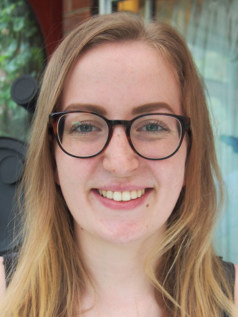
Molly Burkmar
I’m currently studying for an MPhys in physics, astrophysics and cosmology at the University of Portsmouth, UK.
During my second year I decided to apply for South East Physics Network (SEPnet) placements, after learning about the organization at a careers day at university. SEPnet links university physics departments in south-east England and organizes summer placements for physics undergraduates and PhD students to develop their employability skills and raise awareness of their career options in business and industry. I looked through the profiles of more than 60 placements and applied for five, but it was the placement at Winchester Science Centre that caught my eye, as I’m thinking about going into teaching. Thankfully, the interview went really well and I was offered the job. I was really nervous to start with as this was my first job in the science industry, but the team was very welcoming, and I got settled in quickly.
My placement at Winchester was split into two parts: being an “inspirer” and evaluating an exhibit. Most of my time was spent on the former, which involved science busking, floor walking around the exhibits and presenting the live science show. My project involved evaluating a display known as “Stem Cell Mountain” and recommending how to improve it.
My confidence has increased from presenting shows. I was nervous about doing them to begin with, but I started by teaming up with another member of staff to deliver them and presented my first solo show in front of the head of the planetarium. This was really helpful to gain confidence and get constructive feedback before doing them solo and it became my favourite part of the job. I have gained so much experience being an educator too. I picked up tips on how others presented and taught around the centre, which helped me to successfully communicate to a wide range of ages and science backgrounds. Seeing children learning and getting excited about science has been the most rewarding part of the job.
I used skills from my laboratory module at university during the project, such as keeping a lab notebook, but I’ve also learnt a lot about evaluation. I’ve taken observations, semi-structured interviews and surveys as well as analysed both quantitative and qualitative data. I then used the data to make small modifications to the exhibit to see if they were successful so I could make recommendations on how to improve it. My study was one section of a bigger project to modify Stem Cell Mountain, but it was really interesting to see the evaluation side from start to finish.
By undertaking a placement, I’ve gained so much experience that I can use to help me with the rest of my degree and when applying for jobs. I would really recommend completing a placement in an area you’re interested in as there are a lot of job-specific skills that can’t be taught at university.
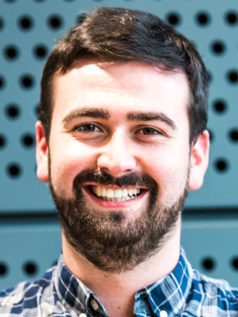
Adam Powell
I am a graduate student with the University of Calgary, Canada, as a member of the Antihydrogen Laser Physics Apparatus (ALPHA) collaboration at CERN.
During the foundation year of my physics degree at Swansea University, UK, when the opportunity to lead the university’s physics society arose, I leapt at the chance. I had begun my degree at a disadvantage, not having taken maths past the age of 16, so I was all the more motivated to find my place. A few months after taking on the society, I had helped to organize the first in a number of careers events to help my peers (and myself) see the vast number of possible pathways through physics. This was also my first interaction with IOP Wales, and my first outreach event came soon after – eventually I became a campus ambassador and nations committee member.
As my network started to grow, I was offered an internship with the university’s employability academy. I spent a summer focusing on the softer skills that are incredibly important in an increasingly competitive workplace. I was encouraged to apply for the Undergraduate of the Year awards sponsored by Target Job and was shortlisted in the men’s category. The reward for this was an interview at L’Orèal UKI. I was aware of the brand but had no experience in the beauty industry. Determined to show what I could do for them, I took the sample data provided and set to work on analysis. After combining skills learnt through my studies with some impromptu market research (questioning the unfortunate travellers on a Swansea to London train about the various products) I was offered a summer placement in the business development team. While my time with L’Orèal was full of very valuable learning experiences and wonderful people, it wasn’t for me long-term. I learnt the most valuable lesson of all – that it is just as useful to know what you don’t want to do, as what you actually want to do.
I returned for my final year at Swansea, now as an MPhys student, with a desire to focus on research. I was then incredibly fortunate to be sent to CERN to carry out my final-year project with the ALPHA experiment. I spent three months working in an environment that pushed me every day, and I was hooked. Knowing that I wanted to return after my MPhys, I set about trying to find a postgraduate position. A few discussions later, I was hired as a research assistant by the TRIUMF laboratory in Vancouver to help in the construction of the new ALPHA-g experiment at CERN. This then led to my current place as a graduate student with the University of Calgary as a member of the ALPHA collaboration and I currently hold a Leverhulme Trust Study Abroad Studentship.
Despite now being based outside Wales, I’m still a regular volunteer and committee member, and played a role in organizing the IOP-sponsored Conference of Astronomy and Physics Students 2019 at Swansea.
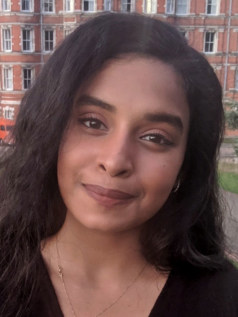
Srinidhi Rajagopalan
I’m currently pursuing a physics (Euromasters) MSc at Royal Holloway University of London.
After the first year of my Master’s degree, I was looking for opportunities to gain some experience working in professional labs, which I saw as necessary for my career plan. I found many of the adverts on GRADnet interesting, but was particularly keen on working at the National Physical Laboratory, because most companies advertised for data science internships, whereas NPL’s placement was focused on experimental physics.
I worked on a project to build a method to reconstruct the spectrum of a 2D material using photoluminescence imaging techniques. This involved using the LabView platform, which is an indispensable tool in experimental physics. I also worked in an optics lab where I learnt not only how to work with several instruments, but also how to approach a new and unfamiliar instrument. While it was a struggle to transfer my bookish knowledge to real-life experiments, I learnt what experimental physics actually entails.
The placement helped me sharpen both my technical and professional skills. The standard of professionalism expected of a student is not that expected in a real working environment and I learnt a lot by just watching my superiors and peers every day. Indeed, I believe this placement was one of the most important learning experiences of my career so far, and will help me work on future projects more efficiently.
I also made many friends who were mostly PhD students. From them, I was able to get a great insight into how the organization worked and all its activities. They were then able to give me advice about what they would have done differently before starting their PhD.
The placement was an invaluable learning experience. I would highly recommend anyone who has the chance to take up a summer placement with SEPnet, GRADnet or the IOP, and to utilize it to its fullest.
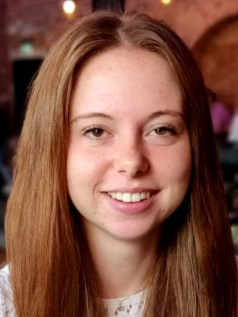
Holly Stemp
I am currently a PhD student in quantum computing at the University of New South Wales (UNSW) in Sydney, Australia.
During the second year of my MPhys degree in physics at the University of Surrey, UK, I began to think more seriously about what I wanted to do after I graduated. Pursuing a career in research had always interested me, so I figured that a research-orientated placement would be the perfect opportunity to discover first-hand what it is like to work in a research environment. This led to me applying for an eight-week SEPnet summer placement at the National Physical Laboratory in Teddington. There, my role was to evaluate a phenomenon known as “non-uniqueness”, associated with standard platinum resistance thermometers used to realize the International Temperature Scale of 1990.
Non-uniqueness is a very subtle form of uncertainty associated with temperature measurement that, as a result of the ever-improving precision to which we can perform temperature measurements today, is becoming a fundamental limiting factor in the accuracy we are able to achieve. My task during the placement was to try to quantify the uncertainty associated with this non-uniqueness in the thermometers. The first half of the placement was spent performing measurements in the lab, where I determined the resistance ratios of the thermometers in temperature-controlled oil baths, liquid nitrogen and fixed-point cells, over a range from –196 °C to 232 °C. I then plotted and analysed the data collected in order to gain a clearer picture of how non-uniqueness affects our most accurate temperature measurements.
This was my first experience of not only collecting high-quality experimental data but also of performing careful data analysis, both of which are absolutely invaluable skills for a career in research. Conducting research during my placement was a very different experience to studying at university, as many of the questions we were asking didn’t have a known answer. This aspect of exploring the unknown is something I found really exciting and it led to me developing a wide range of useful skills, from critical thinking to problem solving.
Working at NPL definitely confirmed my desire to work in a research environment and showed me the wide variety of opportunities available. I was constantly asking the staff at NPL about their research and everyone was very happy to share their work with me, so I got to learn a lot about metrology/traceability of measurement and its importance in every aspect of our lives.
For any undergraduate interested in expanding their skill set and experiencing the real-world implications of what they are taught in lectures I would highly recommend carrying out a placement. Not only does it look great on your CV, it also provides some invaluable tools for a potential career in research in the future. Don’t be put off applying if you don’t have a lot of direct knowledge about the placement subject area, as plenty of help and support are provided. I knew nothing about the world of metrology before my placement, but I found the scheme to be a fantastic opportunity to extend my knowledge of a given area.
How the IOP can help you
The Institute of Physics (IOP) is here to support you in building a successful career through our programme of activities. Members of the IOP can:
- Become a part of the IOP student community and participate in a host of activities to develop skills: iop.org/student-community
- Volunteer for IOP-led physics engagement activities to practice your communication, organizational and teamwork skills: iop.org/volunteer
- Plan and organize scientific meetings, working in collaboration with other IOP groups and sister societies. Promote events through your institutions and networks, and coordinate and generate digital content for your chosen group(s): iop.org/groups
- Gain an advantage in the job market by attending our employer-led careers events and participate in career-themed webinars. You can also participate in events and conferences, at exclusive member discounted rates, to keep up to date and network with peers and experts in academia and industry: iop.org/events
- Make use of the IOP careers hub, which will support you in writing your CV, practising for interviews, delivering presentations, and effective time management, among many other useful resources to support your future career choices: iop.org/member-services
- Take advantage of our international travel grants to attend conferences, such as the Research Student Conference Fund, the C R Barber Trust and Early Career Researchers Fund: iop.org/grants
- Following graduation, join the Member grade and use the designatory letters MInstP after your name, to demonstrate your commitment and professionalism: iop.org/member

